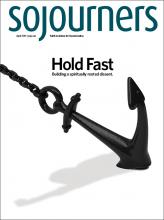I WAS ONCE on a panel with a counselor who proudly claimed her identity as a woman as the reason for her feminist approach to counseling. Toward the end of the discussion, she told the story of a client who frustrated her. A highly educated middle-aged mother of three, this woman (the client) had stepped off the career track to take care of her children. The children were now grown, and she had come to counseling to think through her next steps. My fellow panelist encouraged this client to claim her identity powerfully and express it in public fiercely. The client liked this idea. Some weeks later, she told her counselor that she had gone back to the Catholic church of her childhood and started to attend pro-life rallies.
“That wasn’t what I meant when I told her to claim her identity and express it in public,” the counselor deadpanned, and the liberal university audience laughed along with her.
The exchange left me feeling queasy. Here was a counselor purporting to empower the identity and expression of a client in a period of transition and then being disappointed that her client hadn’t chosen the identity and expression the counselor desired. And the public affirmation of the counselor in a room full of people who clearly shared her worldview felt doubly unsettling.
Read the Full Article

